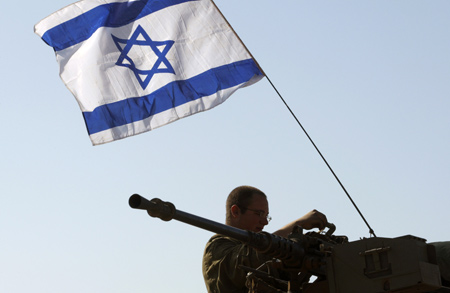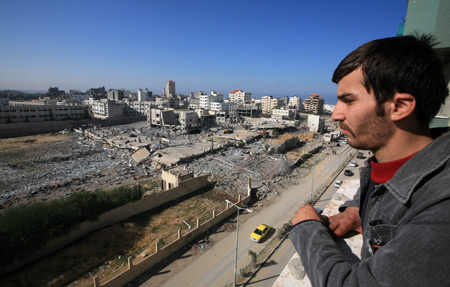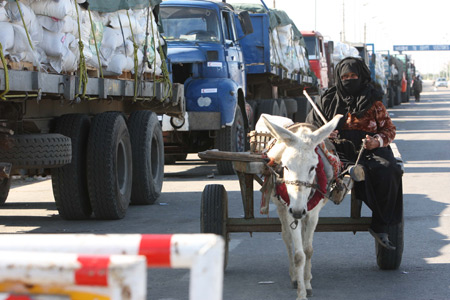The last Israeli soldier had left Gaza Strip on Wednesday, just four days after Israel declared a unilateral ceasefire with Gaza militants led by Hamas, ending an unprecedented 22-day military offensive on the enclave, but what Gazans concern most is what would happen next?
Right after the Israeli assault was over, 1.5 million Palestinians were shocked to see the mass of destruction and to hear the horrible number of casualties the Israeli military operation had left.
 |
|
An Israeli soldier works on a tank near Kibbutz Mefalsim, just outside the northern Gaza Strip January 21, 2009. [Xinhua/Reuters] |
The 22-day Israeli military offensive on Gaza Strip had left around 1,400 people killed, 5,500 wounded, 4,000 houses destroyed and a complete destruction of life and infrastructure.
As they were checking their destroyed homes and burying their beloved with tears, the question that can be read from their eyes is what will happen next, another war or a positive breakthrough to end their suffering and never see violence again.
 |
|
A Palestinian man looks at buildings destroyed in Israeli military strikes in central Gaza City, Jan. 21, 2009. The Israeli military attacks on the Gaza Strip have left 1,414 Palestinians dead and 5,500 others wounded. [Wissam Nassar/Xinhua] |
"I hope that after all this war and after the long suffering of the siege that lasted for almost two years, the parties will be able to reach an agreement that reopen the crossings and unifies Gaza Strip and West Bank under one united government or authority," said Khalid Shahwan, a Palestinian academic.
But Palestinian analysts were divided in answering the question, some of them said that this war had brought both Israel and the Palestinians back to square one and the crisis will start again. Others voiced more optimistic due to the changes in the United States and in Israel.
 |
|
An Egyptian woman on her donkey cart passes trucks loaded with aids outside Rafah Crossing at the Egyptian-Gaza border, Jan. 21, 2009. [Hua Chunyu/Xinhua] |
"I believe that the whole situation is very complicated. Hamas, which rules the Gaza Strip has deep disputes with President Mahmoud Abbas and Fatah movement, who rule the West Bank," said Talal Oukal, a Palestinian analyst.
He added that everything is linked to a historic reconciliation between the two big rival groups, "and once they agree, I believe that other problems would be marginal and can be resolved through diplomatic ways between Israel and the Palestinians."
However, he warned that if the two parties fail to achieve reconciliation soon, "I believe that the situation would remain as it is because the Western world led by the United States, including Israel, are not willing to hold direct talks with Hamas which basically rejects to condemn violence or recognize Israel."
He added that the issues that can be resolved through diplomatic ways, if Fatah and Hamas reunite and agree on a reconciliation, are "the release of captive Israeli soldier Gilad Shalit and the reopening of Gaza Strip crossing points including Gaza-Egypt Rafah border crossing."
Other analysts who voice more optimistic believe that new U.S. President Barack Obama would change the awful situation that his predecessor George W. Bush brought to the whole world, mainly the area of the Middle East.
"I believe that Obama will resolve the problem from its roots, where he would leave Iraq and Afghanistan and would hold peace talks with Iran. In case these talks are held, I believe that this would be positively reflected on the ties between the two rival Palestinian groups," said Hisham Abu Taha, anther Palestinian analyst.
He added that it was obvious that Hamas movement was an ally to the Iranian camp that includes Syria, Qatar and Hezbollah, while President Mahmoud Abbas and his Fatah movement are allies to U.S. camp that includes Israel, Egypt, Jordan, Saudi Arabia and some European countries.
Abu Taha said "this is the only way to end up the Middle East crisis, to close the gaps between the two camps, and if the two camps achieve a reconciliation, I believe that Fatah and Hamas will end their disputes."
Other Gazans were not very much interested to know what's next, because they were busy coming back to their homes they fled and waking up of a long nightmare that last for 22 days.
"I don't want to know what will be happening next, the only thing I care about now is how to feed my children and how to find a job and how to renovate my house," said Ahmed el-Dabba, a Palestinian employee.
He added that "when I resettle and the situation gets politically better during the one year truce that both Hamas and Israel are speaking about, and when Gaza is rebuilt, then we will know what will be next."
(Xinhua News Agency January 22, 2009)